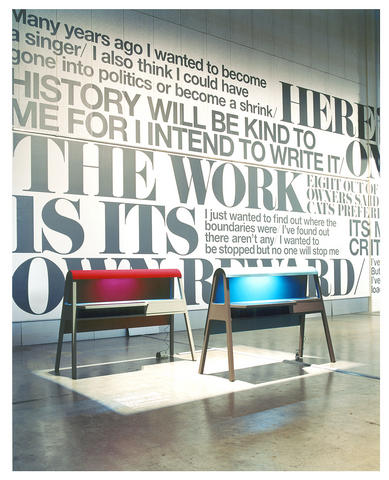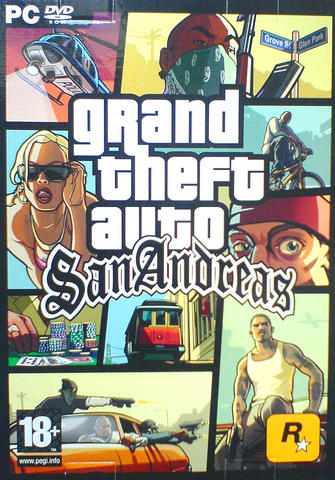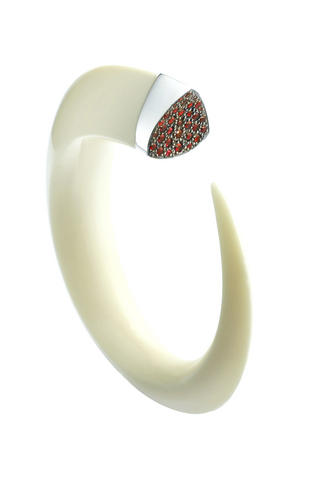The creative industries have been billed as the way of the future, a transformation of the abstruse world of arts and design into a driving force behind commercial development and a vibrant, sophisticated retail culture. This industry has been growing rapidly in the UK, and London has been transformed into "arguably the creative capital of the world," according to David Percival, head of UK Trade and Investment in Taiwan. Love and Money, an exhibition of the best of British design, has set out to showcase the UK's success, and also to establish a platform for cooperation between UK designers and investors in Asia.
The commercial intention of the show is right there in its title. While the purpose of design is certainly to make beautiful things, this is not really enough, as plenty of artists in Taiwan have repeatedly discovered. "When they [designers] do the design, they love it, ... but there is also a big commercial need out there for them to do business and bring in the money," said Amanda Lin (林君玲), the senior commercial officer with the British Trade and Cultural Office who is overseeing the launch of Love and Money in Taipei. The ability to link the love and the money has been crucial to the success of the creative industries in the UK and is a source of envy among many nations that wish to emulate this success. (Creative industries now account for 8.2 percent of GDP in the UK.)
"It is not just about general design. A lot of it is to target the specific needs of Taiwan," said Percival.

PHOTOS: COURTESY OF THE BRITISH COUNCIL
"Taiwan's companies, especially consumer electronics companies, are increasingly becoming brand companies (rather than contract manufacturers). When you are doing your own brand, design becomes much more important. You are no longer just selling on price, but on quality and an image. This is the opportunity for us to work with Taiwanese companies ... . They [Taiwanese companies] don't just work with British designers, but also with British branding companies and marketing companies," Percival said.
The focus on architectural issues is not coincidental either. Percival points to the massive urban development projects that Taiwan is planning. "There is around US$12 billion of projects that are going to be up for grabs in Taiwan over the next five years. ... We are looking at projects like the National Exhibition Center in Kaohsiung and the ideas for a new financial services center around Taipei Main Station."
Love and Money has toured five countries in Asia (and will be moving on to South Korea after it wraps up in Taipei), but according to Percival, the Taiwan show has evolved into the biggest of all, largely due to the great interest of local companies. While the exhibition at Taipei 101 will doubtless present a fascinating showcase of what British designers of every sort are doing, much of the activity for Love and Money will center on the "wrap around events," most notably the UK architecture seminars featuring Adams Kara Taylor, Creative Designs International and Benoy Architects and the Design Forum with Industrial Facilities and Wedgewood, targeted at Taiwan's creative industry professionals.

"These are all commercially proven designers, designers who work in business and run successful design houses or architectural firms. ... It is not just about how important good design is for the quality of life, but that these guys can also make money out of it," Percival said. The success of the UK has been acknowledged in Taiwan in the most telling terms: The number of Taiwanese students going to the UK to enroll in design-related programs has increased by 30 percent over the last three years.
Continental Europe has traditionally been the home of fine design, but over the last decade, the UK has made rapid strides to equal and in many areas supercede established rivals. "It has become incredibly diverse," said Percival. "London is not made up of British designers, it is made up of multicultural designers from all over the world. ... It is all global design, and this makes it very adaptable. If you go into a British design house, you'll find people of every nationality in the world there."


Exceptions to the rule are sometimes revealing. For a brief few years, there was an emerging ideological split between the Democratic Progressive Party (DPP) and Chinese Nationalist Party (KMT) that appeared to be pushing the DPP in a direction that would be considered more liberal, and the KMT more conservative. In the previous column, “The KMT-DPP’s bureaucrat-led developmental state” (Dec. 11, page 12), we examined how Taiwan’s democratic system developed, and how both the two main parties largely accepted a similar consensus on how Taiwan should be run domestically and did not split along the left-right lines more familiar in

As I finally slid into the warm embrace of the hot, clifftop pool, it was a serene moment of reflection. The sound of the river reflected off the cave walls, the white of our camping lights reflected off the dark, shimmering surface of the water, and I reflected on how fortunate I was to be here. After all, the beautiful walk through narrow canyons that had brought us here had been inaccessible for five years — and will be again soon. The day had started at the Huisun Forest Area (惠蓀林場), at the end of Nantou County Route 80, north and east

Specialty sandwiches loaded with the contents of an entire charcuterie board, overflowing with sauces, creams and all manner of creative add-ons, is perhaps one of the biggest global food trends of this year. From London to New York, lines form down the block for mortadella, burrata, pistachio and more stuffed between slices of fresh sourdough, rye or focaccia. To try the trend in Taipei, Munchies Mafia is for sure the spot — could this be the best sandwich in town? Carlos from Spain and Sergio from Mexico opened this spot just seven months ago. The two met working in the

This month the government ordered a one-year block of Xiaohongshu (小紅書) or Rednote, a Chinese social media platform with more than 3 million users in Taiwan. The government pointed to widespread fraud activity on the platform, along with cybersecurity failures. Officials said that they had reached out to the company and asked it to change. However, they received no response. The pro-China parties, the Chinese Nationalist Party (KMT) and Taiwan People’s Party (TPP), immediately swung into action, denouncing the ban as an attack on free speech. This “free speech” claim was then echoed by the People’s Republic of China (PRC),